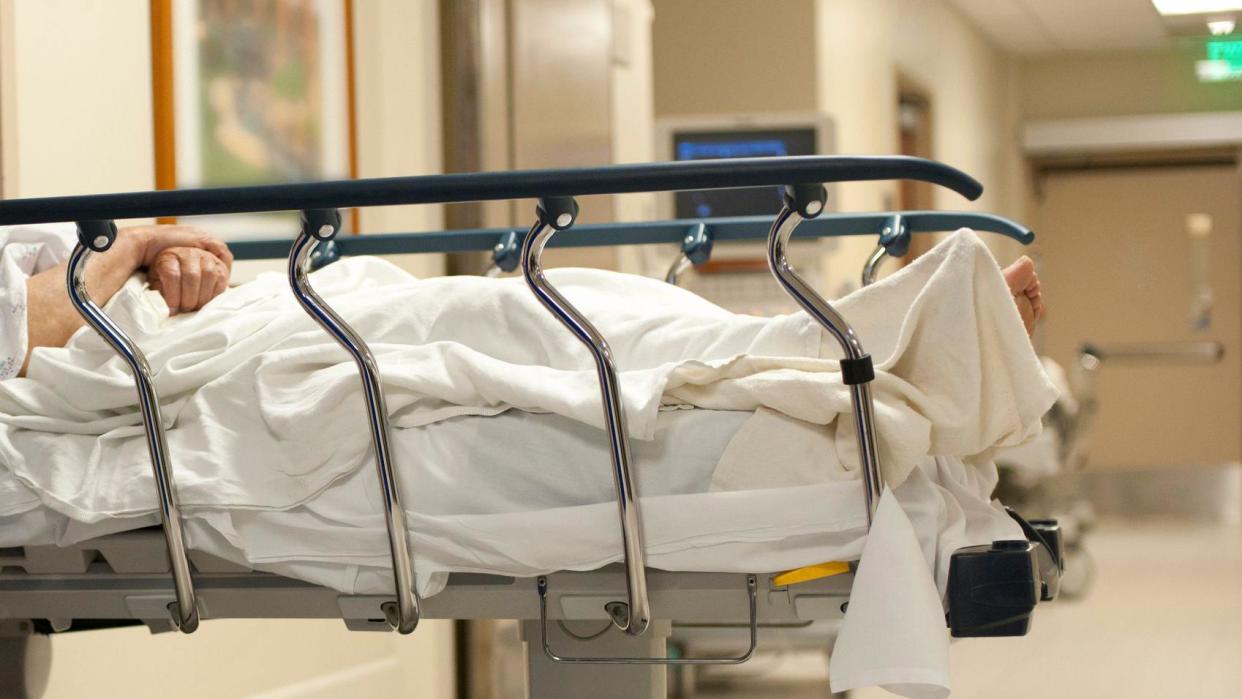Corridor care is unacceptable, says nursing union

Caring for patients in hospital corridors has become "normal", despite being unsafe and unacceptable for patients, says a report from the Royal College of Nursing.
At its annual conference starting on Monday, RCN boss Prof Nicola Ranger will say corridor care is "a national emergency for patient safety".
The Conservatives said the NHS budget had increased by a third since 2010 and more community diagnostic centres had opened to ease the pressure on A&E.
Labour said nurses were sounding the alarm because of 14 years of Conservative neglect, while the Lib Dems said they have an ambitious plan to fix the health crisis.
In the RCN's report, the nursing union is calling for corridor care to be reported whenever it happens so that the problem can be eradicated everywhere in the UK.
Its annual online survey of 11,000 nursing staff - out of a total of more than 700,000 in the UK - found one in three had witnessed patients being cared for in inappropriate places during their most recent shift. This figure has risen over the past two years.
Nurses who responded said they had been involved in caring for patients on chairs, rather than beds or trolleys, in waiting rooms, corridors and other locations not designed for patients.
The survey is part of a campaign by the union to improve the working conditions of nurses.
When nurses were asked about the impact on patients, two-thirds said their privacy and dignity were compromised while more than half said it meant a lack of access to toilet facilities and drinking water, as well as vital equipment, such as oxygen.
A stroke patient recently told BBC News he'd waited more than 36 hours on a trolley at a Brighton hospital.
And a BBC Newsnight investigation featured a patient who had spent three days on a corridor before being moved to a ward, and said his care had been "horrendous".
However, some NHS bosses say so-called corridor care is freeing up ambulances and saving lives.
'Appalling state'
The waiting list for NHS treatments in England currently stands at 7.5 million.
The Conservatives said thousands more permanent hospital beds had been created to free up capacity and cut waiting times.
Health minister Andrew Stephenson said waiting lists for surgery and treatments had experienced the biggest six-month fall in 10 years outside the pandemic.
"We have boosted the budget by over a third in real terms since 2010, while the 160 community diagnostic centres we have opened across the country are delivering millions more scans, tests and checks to people outside of hospital settings to deliver more care closer to home," he added.
Wes Streeting, the shadow health secretary, said only Labour had a plan to deliver change for the NHS.
"NHS nurses are sounding the alarm on the appalling state of the NHS after 14 years of Conservative neglect," he said.
“Patients and staff alike can see that the NHS is broken. Only Rishi Sunak and his party won’t acknowledge that the crisis in the NHS is a national emergency, and if they can’t diagnose the illness then how can they be trusted to cure it."
Lib Dem health spokesperson Daisy Cooper said the Conservatives had run the health service "into the ground".
"The Liberal Democrats have an ambitious plan to fix crumbling hospital buildings and provide everyone with the high-quality social care they deserve. This is at the heart of our offer to voters at this election and our plan to fix the health crisis."
Patient flow
NHS waiting lists in Scotland have also reached a record high, with latest figures showing more than 690,000 waits for appointments or treatment for non-urgent care.
A Scottish Government spokesperson said health boards were taking action to improve patient flow and reduce delays.
It said the 2024-25 Scottish budget provided more than £19.5m for health and social care.
“Although challenges and difficult decisions remain, this has given our NHS a real terms uplift in the face of an extremely difficult financial landscape."
A new act has recently been introduced to help ensure appropriate staffing levels are in place in all health and care settings, the Scottish government added.
An NHS England spokesperson said one of its key ambitions in urgent and emergency care was to improve patient flow in and out of hospitals.
"The NHS delivered an extra 5,000 core beds this winter, alongside measures to help patients avoid an A&E admission in the first place, and tools like our world-leading virtual ward programme and discharge lounges all help to improve care for patients," the spokesperson said.
"We are working closely with colleagues in local authorities and community settings to send more patients home when they are medically fit to leave, freeing up beds for patients who need them most.”


